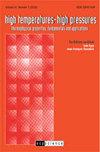Exergy and energy analysis on coal/biomass co-gasification in supercritical water
IF 0.6
4区 工程技术
Q4 Engineering
引用次数: 3
Abstract
Supercritical water gasification (SCWG) is a promising technology for clean and efficient utilization of carbonaceous organic materials at high temperature and pressure. Coal/biomass co-gasification in supercritical water (SCW) is a better choice for both coal and biomass to offset their disadvantages. Therefore, based on the experimental results of coal/carboxymethylcellulose (CMC, as a model compound of biomass) co-gasification in SCW by continuous flow thermal-catalytic reaction system at a reactor wall temperature of 650 �C, pressure of 25 MPa, a residence time 30 s and 0.1 wt% NaOH additive, the effects of heat transfer efficiency, heat supply methods, and CMC fraction on exergy and energy efficiency of reactor (the core device in reaction system) were investigated. The results show that energy and exergy efficiencies are in excess of 69% and 43%, respectively. The priority order of heat supply for the reactor is as follow: lower temperature heat source > higher temperature heat source > direct electricity heat supply method. The heat transfer efficiency has great influence on the energy and exergy efficiencies in terms of thermophysics. The higher CMC fraction is helpful to improve exergy efficiency.煤/生物质在超临界水中共气化的能能分析
超临界水气化(SCWG)是一种在高温高压下清洁高效利用含碳有机材料的技术。煤/生物质在超临界水中共气化是煤和生物质弥补各自缺点的较好选择。因此,基于实验结果的煤/羧甲基纤维素(CMC作为模型化合物的生物质能)co-gasification标准铜线的连续流thermal-catalytic反应系统的反应器壁温650�C, 25 MPa的压力,停留时间30年代和0.1 wt %氢氧化钠添加剂,传热效率的影响,供热方法,CMC分数(火用)和能源效率的反应堆的核心设备(反应系统)。结果表明,能源效率和火用效率分别超过69%和43%。反应器的供热优先顺序为:低温热源>高温热源>直接电供热方式。从热物理的角度来看,传热效率对能量效率和火用效率有很大的影响。较高的CMC分数有利于提高火用效率。
本文章由计算机程序翻译,如有差异,请以英文原文为准。
求助全文
约1分钟内获得全文
求助全文
来源期刊

High Temperatures-high Pressures
THERMODYNAMICS-MECHANICS
CiteScore
1.00
自引率
9.10%
发文量
6
期刊介绍:
High Temperatures – High Pressures (HTHP) is an international journal publishing original peer-reviewed papers devoted to experimental and theoretical studies on thermophysical properties of matter, as well as experimental and modelling solutions for applications where control of thermophysical properties is critical, e.g. additive manufacturing. These studies deal with thermodynamic, thermal, and mechanical behaviour of materials, including transport and radiative properties. The journal provides a platform for disseminating knowledge of thermophysical properties, their measurement, their applications, equipment and techniques. HTHP covers the thermophysical properties of gases, liquids, and solids at all temperatures and under all physical conditions, with special emphasis on matter and applications under extreme conditions, e.g. high temperatures and high pressures. Additionally, HTHP publishes authoritative reviews of advances in thermophysics research, critical compilations of existing data, new technology, and industrial applications, plus book reviews.
 求助内容:
求助内容: 应助结果提醒方式:
应助结果提醒方式:


